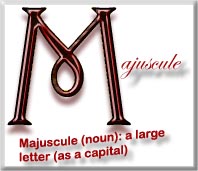Capitalizing People's Titles
and the Names of Political Entities
One of the most frequently asked questions about capitalization is whether or not to capitalize people's job titles or the names of political or quasi-political entities. Most writing manuals nowadays seem to align themselves with the tendency in journalistic circles: less is better. When a title appears  as part of a person's name, usually before the name, it is capitalized: Professor Farbman (or Professor of Physics Herschel Farbman), Mayor Perez, U.S. Secretary of State Colin Powell. On the other hand, when the title appears after the name, it is not capitalized: Herschel Farbman, professor of history; Eddie Perez, mayor of the city of Hartford; Juan Carlos, king of Spain. Although we don't capitalize "professor of history" after the individual's name, we would capitalize department and program names when they are used in full*: "He worked in the Department of Behavioral Sciences before he started to teach physics." (We do not capitalize majors or academic disciplines unless they refer to a language, ethnic group, or geographical entity: Roundbottom is an economics major, but he loves his courses in French and East European studies.) as part of a person's name, usually before the name, it is capitalized: Professor Farbman (or Professor of Physics Herschel Farbman), Mayor Perez, U.S. Secretary of State Colin Powell. On the other hand, when the title appears after the name, it is not capitalized: Herschel Farbman, professor of history; Eddie Perez, mayor of the city of Hartford; Juan Carlos, king of Spain. Although we don't capitalize "professor of history" after the individual's name, we would capitalize department and program names when they are used in full*: "He worked in the Department of Behavioral Sciences before he started to teach physics." (We do not capitalize majors or academic disciplines unless they refer to a language, ethnic group, or geographical entity: Roundbottom is an economics major, but he loves his courses in French and East European studies.)
The capitalization of words that refer to institutions or governmental agencies, etc. can well depend on who is doing the writing and where or from what perspective. For instance, if I were writing for the city of Hartford, doing work on its charter or preparing an in-house document on appropriate office decor, I could capitalize the word City in order to distinguish between this city and other cities. "The City has a long tradition of individual freedom in selecting wallpapers." If I were writing for the College of Wooster's public relations staff, I could write about the College's new policy on course withdrawal. On the other hand, if I were writing for a newspaper outside these institutions, I would not capitalize those words. "The city has revamped its entire system of government." "The college has changed its policy many times."
We don't capitalize words such as city, state, federal, national, etc. when those words are used as modifiers "There are federal regulations about the relationship of city and state governments. Even as nouns, these words do not need to be capitalized: "The city of New York is in the state of New York" (but it's New York City). Commonly accepted designations for geographical areas can be capitalized: the Near East, the American South, the North End (of Hartford), Boston's Back Bay, the Wild West. Directions are not capitalized unless they become part of the more or less official title of a geographical entity: "He moved from south Texas to South Africa."
Capitalization in E-Mail
For some reason, some writers feel that e-mail should duplicate the look and feel of ancient telegraph messages, and their capitals go the way of the windmill or they go to the opposite extreme and capitalize EVERYTHING. That's nonsense. Proper and restrained capitalization simply makes things easier to read (unless something is capitalized in error, and then it slows things down). Without the little tails and leaders we get in a nice mixture of upper- and lower-case text, words lose their familiar touch and feel. Text written in ALL CAPS is extremely difficult to read and some people regard it as unseemly and rude, like SHOUTING at someone close at hand. Restrain your use of ALL CAPS in e-mail to solitary words that need further emphasis (or, better yet, use italics or underlining for that purpose, if your e-mail client provides for that treatment).
Words Associated with the Internet
There is considerable debate, still, about how to capitalize words associated with the Internet. Most dictionaries are capitalizing Internet, Web, and associated words such as World Wide Web (usually shortened to Web), Web page, Web site, etc., but the publications of some corporations, such as Microsoft, seem to be leaning away from such capitalization. The Yale Style Manual recommends capitalization. The words e-mail and online are not capitalized. The Guide to Grammar and Writing is a monument to inconsistency on this issue.
The most important guiding principle in all such matters is consistency within a document and consistency within an office or institution. Probably the most thorough and most often relied upon guide to capitalization is the Chicago Manual of Style, but the Gregg Reference Manual is also highly recommended.
|


 If your computer is equipped with PowerPoint, click on the PowerPoint icon to the right for a brief presentation on capitalization.
If your computer is equipped with PowerPoint, click on the PowerPoint icon to the right for a brief presentation on capitalization.